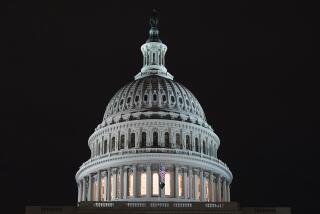Obama administration tries to speed up deal to avert financial crisis
Reporting from Washington — The White House believes that a deficit reduction deal must be reached in a matter of weeks to prevent a financial crisis, but an impasse in Congress deepened Thursday over the core tax and spending disputes that have eluded agreement.
The administration wants to resolve the standoff quickly to avoid pressing against the Aug. 2 deadline for avoiding a federal default, which would upend financial markets, according to a Democratic official familiar with discussions. The White House is seeking an agreement by July 22, said the official, who would describe internal administration thinking only on condition of anonymity.
The White House and congressional Republicans are struggling to reach an agreement on cutting federal deficits in exchange for a vote to raise the nation’s $14.3-trillion debt limit. The federal government has exhausted its borrowing authority, and financial experts warn that an unprecedented federal default would have devastating financial consequences.
The Senate canceled its July 4 recess next week to work toward a compromise. But Republican opposition to President Obama’s agenda extended even to issues that normally have more bipartisan consensus. GOP senators blocked consideration of new U.S. trade pacts with South Korea and other nations in a dispute over the administration’s inclusion of an aid package for workers who lose their jobs as a result of trade deals.
GOP opposition to the pacts points to the difficulty Obama faces in trying to reach an accord on other issues, including the debt ceiling.
The president this week demanded that lawmakers on both sides compromise on a “balanced” approach that cuts spending and also raises revenue to reduce deficits.
Republicans, however, have insisted on spending cuts alone, opposing even largely symbolic Democratic proposals to raise revenue by eliminating specialty tax breaks for owners of yachts, corporate jets and thoroughbred race horses.
Sen. Mitch McConnell of Kentucky, the Senate Republican leader, invited Obama to lunch with GOP senators at the Capitol “to hear directly from Republicans why what he’s proposing won’t pass.”
The White House declined, although Sen. Harry Reid (D-Nev.), the majority leader, said he expected Obama to visit senators next week.
Talks between the administration and Congress broke off last week when the top negotiator for House Republicans dropped out, citing objections to White House tax proposals.
The federal government would need a $2.4-trillion increase in the debt limit to get through the end of 2012, and Republicans are demanding a comparable amount in spending cuts — though their spending plan would also require raising the debt ceiling.
The White House believes a package of at least $2 trillion in combined spending cuts and tax revenue, spread over a decade, is possible. Before talks broke down, the two sides identified more than $1 trillion in spending cuts, including as much as $200 billion in savings from Medicare and Medicaid, according to those familiar with the talks.
Obama this year proposed $760 billion in new revenue, in part by limiting deductions for households whose earnings are in the top 2%, a move that would raise $300 billion over 10 years. Obama also proposed ending various corporate and individual tax deductions, including oil and gas subsidies, and a change in how businesses report the value of their inventories.
But Republican opposition to any new sources of tax revenue has reduced the amount under consideration to an estimated $300 billion or less.
Frustrated by the GOP anti-tax stance, several Democratic senators Thursday pressed the case for ending loopholes for specialty interests. One such break allows racehorse owners to more quickly write off expenses, in what Sen. Jeff Merkley (D-Ore.) dubbed the “Bluegrass Boondoggle.”
“Giving Triple Crown treatment to millionaires while workers are put out to pasture?” Merkley said. “That’s not right. And it’s not the American way.”
GOP leaders have indicated in private meetings that they are willing to close some tax loopholes to raise revenue, but also have acknowledged that such a position would be difficult to sell to rank-and-file Republican lawmakers, said a senior administration official who would describe talks only on condition of anonymity.
It has long been understood that with Republican opposition to raising the debt limit, the GOP-led House will need Democratic votes to approve the increase. Democrats are willing to agree to substantial cuts in programs, the senior administration official said, but also want “some sharing of the pain.”
In private, the GOP leaders know “they need Dems” to pass a bill through the House, and that they have to give Democrats something for those votes, the official said.
Jim Puzzanghera in the Washington bureau contributed to this report.
More to Read
Sign up for Essential California
The most important California stories and recommendations in your inbox every morning.
You may occasionally receive promotional content from the Los Angeles Times.












